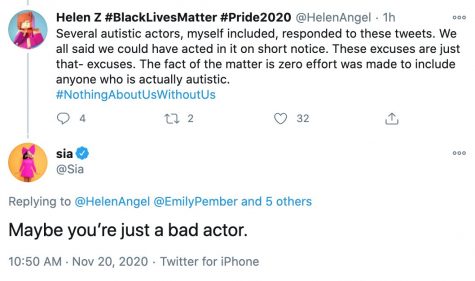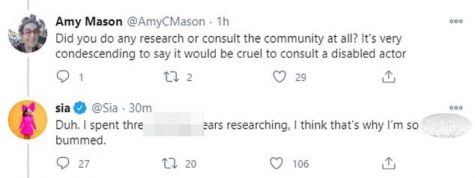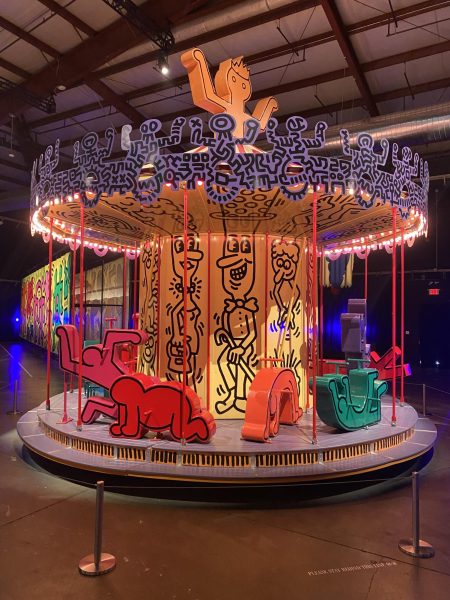Sia’s New Film, “Music,” Raises Controversy within the Autistic Community
February 26, 2021
Australian singer-songwriter Sia has made a directorial debut with her new movie Music. Excitement was brewing considering Sia’s established fame and the movie’s subject matter, said to be focusing on a non-verbal autistic girl. Representation was finally happening, and a big-time singer was bringing it.
Music is about a newly sober drug dealer named Kazu (Kate Hudson) who becomes the sole guardian of her non-verbal autistic half-sister named Music (Maddie Ziegler).

The concept and story sounds good at first—but this goes awry once Maddie Ziegler, a neurotypical girl (someone who doesn’t display autistic or other neurologically atypical patterns of thought or behavior) is cast as a non-verbal autistic girl.
In the trailer released last month, Ziegler was seen portraying Music in a stereotypical way, leaving the autistic community on Twitter furious.
In a Twitter thread with Twitter user @HelenAngel, Sia responded negatively to criticism of her film Music.
Sia claimed she had done three years of research in preparation for the movie and had tried to cast an autistic actor for the role of Music, but she fired her because it was kinder to the actress. Sis also admitted that casting Maddie was ableist and nepotistic in a more recent interview.
She also claimed to be partnered with Autism Speaks for the movie, an autism advocacy group known for their research to find a cure for autism and using fear mongering marketing techniques.
Sia claimed part of her research was spending time with one of her male friends on the spectrum.

This struck another nerve in the autistic community, specifically in autistic women, because women have such a hard time getting diagnosed due to men and women having different traits. Research on autism and neurodivergence is based on research done on boys, which gives little to no foundation on how to test a girl for neurodivergence.
Girls are more self-aware and seen as more emotional, leaving them as an underdiagnosed population. “Masking” is the act of a neurodivergent person changing themselves and concealing their neurodivergence to conform to what’s deemed normal.
Special education teacher Camille Morris said that there continues to be an issue with people who are disabled not having a say in their own narratives.
“In the end, I think this movie is raising awareness to the fact that people with disabilities are not allowed to have as much voice in how they are depicted on screen,” she said. “More often than not, they are not participating in telling their own stories.
“This needs to change so that all people can see more fair and accurate depictions of people of all abilities.”
Although there are still flaws with representation of autistic individuals in the media, there still has been some improvement in representation.
“Many of the movies representing people with autism have placed them as the joke,” she said. “But I do think it’s getting better. We see a lot of roles with high functioning people doing excellent things like being a doctor or a computer programmer.”
One of the biggest issues with the movie was that there are restraint scenes shown in the movie.
According to TikTok influencer Paige Layle, an autistic advocate, the restraint scenes can cause harmful consequences for autistic people. Unfortunately, people use media like films and television to form an opinion or view and displaying dangerous restraint techniques can make people think it’s ok.
These scenes show Music being pinned down on two occasions during meltdowns despite not posing as a danger or threat to others, making for a possibly traumatic scene for both autistic and neurotypical viewers. Sia announced she would be putting trigger warnings before the movie, and has put out an apology after Music was nominated for 2 Golden Globe awards.
Sia claimed Music was going to help the autistic community and bring awareness, yet she continued to try and silence autistic voices to amplify her name. When will autism and other areas of disabilities and neurodivergence have a voice?



Deathmerc • Feb 26, 2021 at 4:50 PM
“She also claimed to be partnered with Autism Speaks for the movie, an autism advocacy group known for their research to find a cure for autism and using fear mongering marketing techniques.”
Actually, Autism Speaks doesn’t even do anything with their money other than line their pockets. I’m autistic and would like to be cured, but until a couple years ago only 1% of actual sound research went towards sound treatments.
https://www.wsj.com/articles/autism-research-should-be-financed-like-venture-capital-1506638131